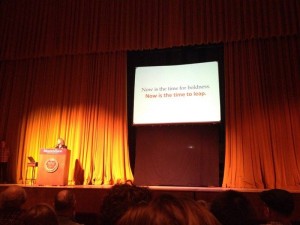“The time for energy democracy has come”, said author and climate change activist Naomi Klein, early last week at a public lecture on her latest book, This Changes Everything: Capitalism vs. the Climate.
On Tuesday, February 26th, we travelled to Sackville, NB to hear Naomi Klein speak on her latest book. Klein is a Canadian journalist who delivered a public lecture at Mount Allison University as part of the University President’s Speakers Series, celebrating the Year of the Environment. Klein is an award winning author, columnist for The Nation magazine, The Guardian newspaper and is a contributing editor at Harper’s magazine. Klein also sits on the board of directors for 350.org – an organization that’s focus is to build a global grassroots climate movement that can hold our leaders accountable to the realities of science and the principles of justice.
We arrived at Convocation Hall greeted by Mount Allison’s Divestment group, a campaign that seeks climate justice through advocating for fossil fuel divestment at Mount Allison University. Everyone attending the lecture received a swatch of orange fabric to wear on their clothing to support the divestment campaign. The hall was packed!

Klein began her talk discussing her book and documentary, This Changes Everything: Capitalism vs. the Climate. The documentary was released at the Toronto film festival in 2015. The film has been screened worldwide and is available for purchase online. Klein spoke of her favourite screening held in Amsterdam in which the film was projected onto a working coal fired plant!
As many know, COP21 was a huge step in the right direction for getting our carbon pollution under control. Klein acknowledged this as well as the important role Canada took in presenting the idea to cap warming the planet at 1.5 degrees. She also discussed the discrepancies of the agreement. The agreement wants to prevent warming to 1.5 degrees globally, but each country’s Intended Nationally Determined Contributions (INDCs) totals to about 3-4 degrees warming. Since humans have been inhabiting the earth the global temperature has increased 1 degree, and dangerous warming is already happening. The main example Klein gave of this was hurricane Katrina in New Orleans. During the last day of the summit, the city was draped with red lines and individuals wearing red to acknowledge that the deal crosses many humanitarian, equity and finance lines.
When it comes to energy creation, leaders have been constantly leaning towards market mechanisms, avoiding the fossil fuel industry all together. Why is this? “Epic bad timing,” says Klein. The guiding principle for leaders should be no new fossil fuel infrastructure. “There is a clash between climate action and economic prosperity,” stated Klein. So how exactly do we tackle this? We need to invest in clean, equitable, renewable jobs and expand low-carbon work including caregivers, teaching, social work, arts and media.
She ended her talk discussing the Leap Manifesto, an energy justice initiative that was created in 2015 at a meeting in Toronto attended by representatives from Canada’s indigenous rights, social and food justice, environmental, faith-based and labour movements. Klein’s final message was encouraging listeners to sign the manifesto and to be bold. She concluded by saying “Now is the time for boldness. Now is the time to leap.”
